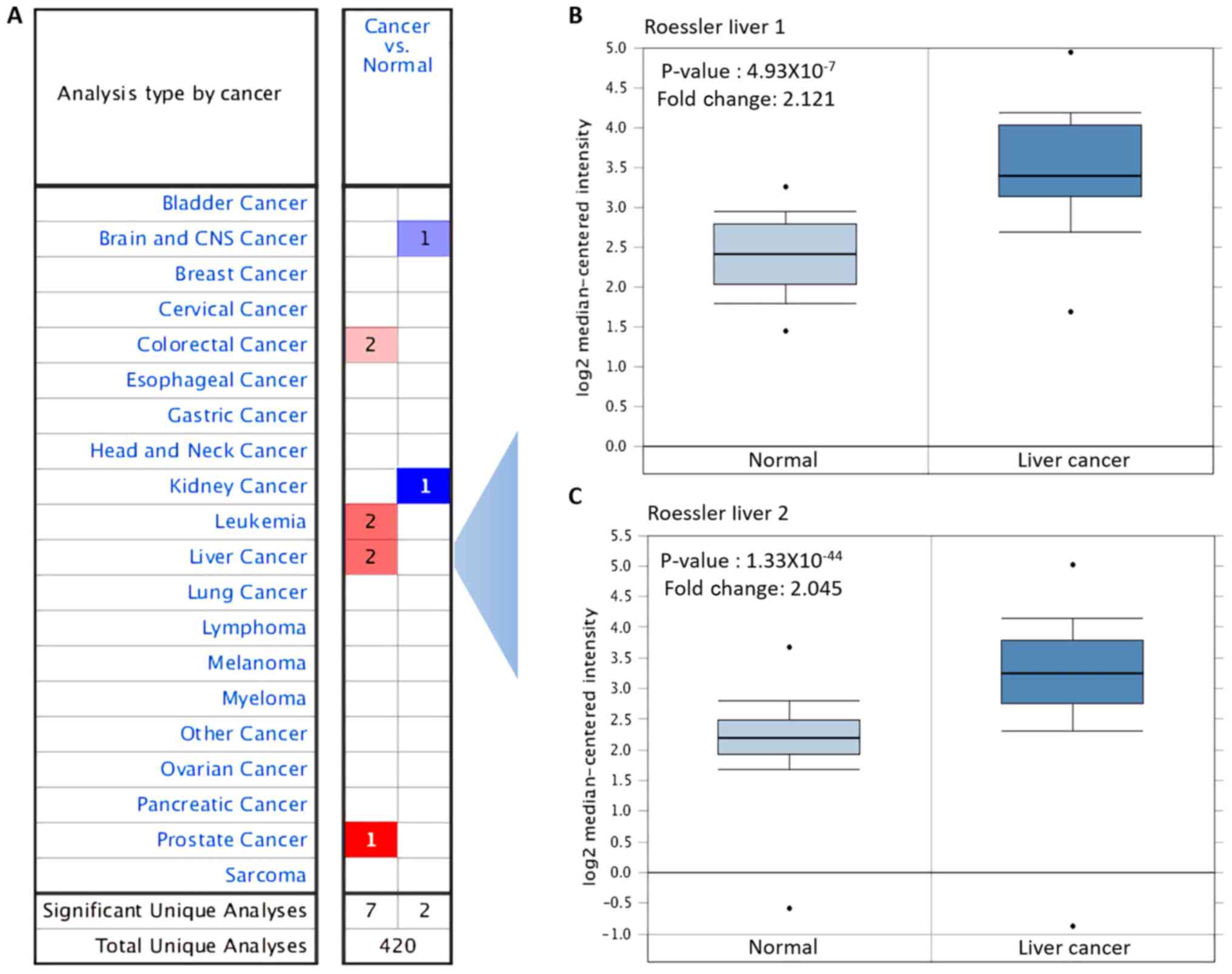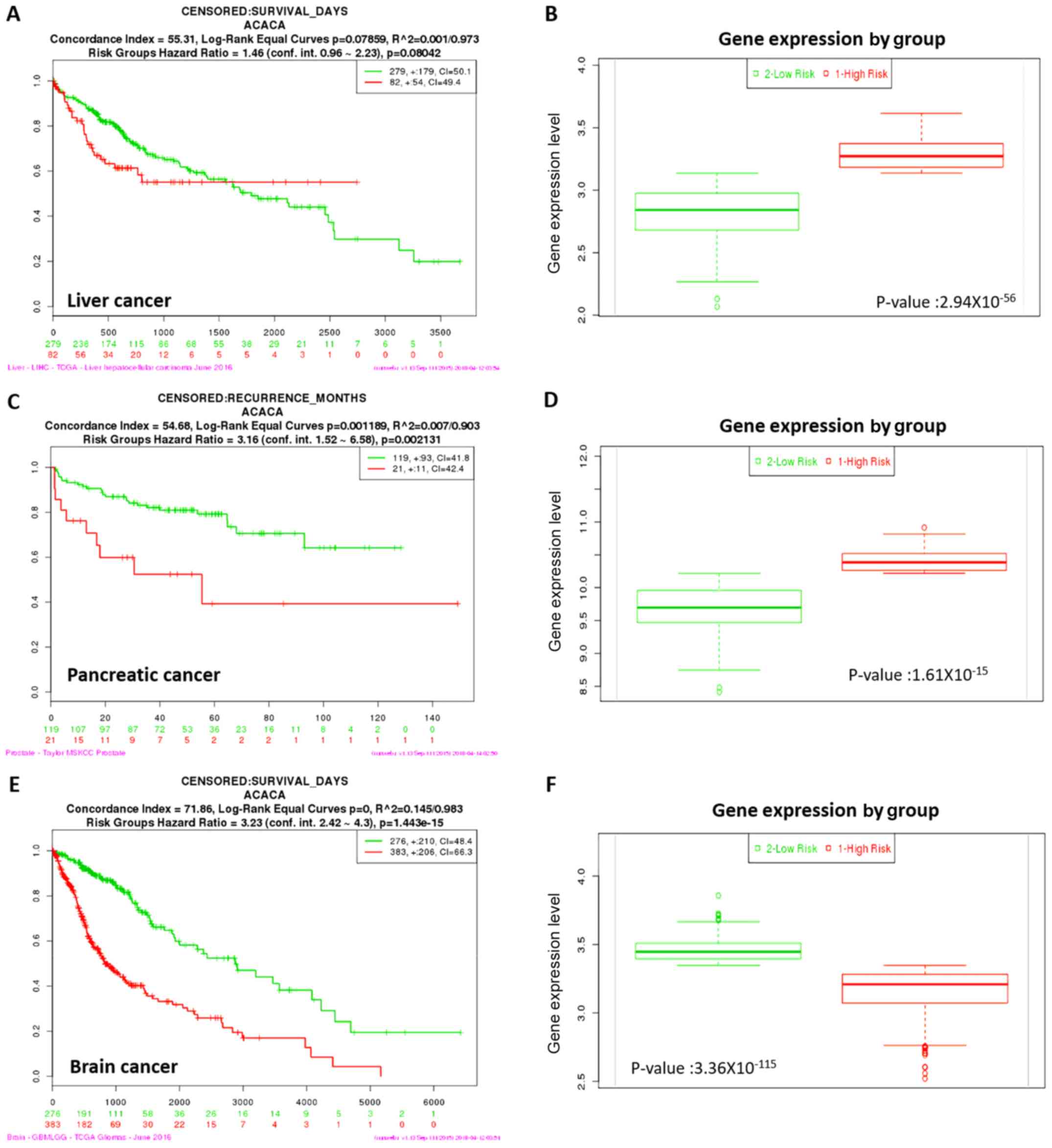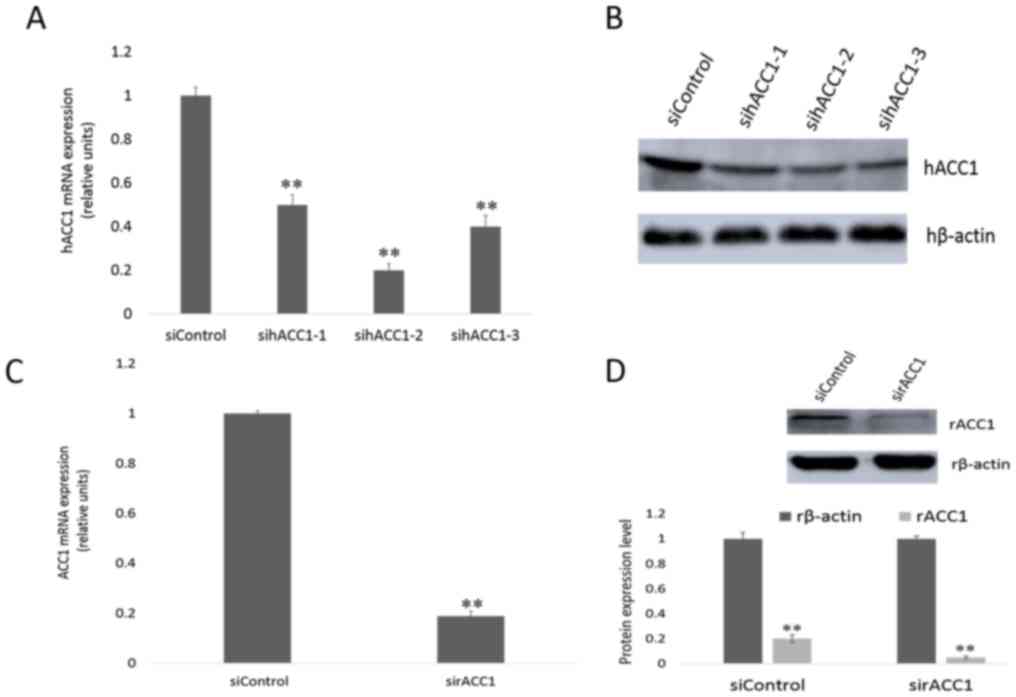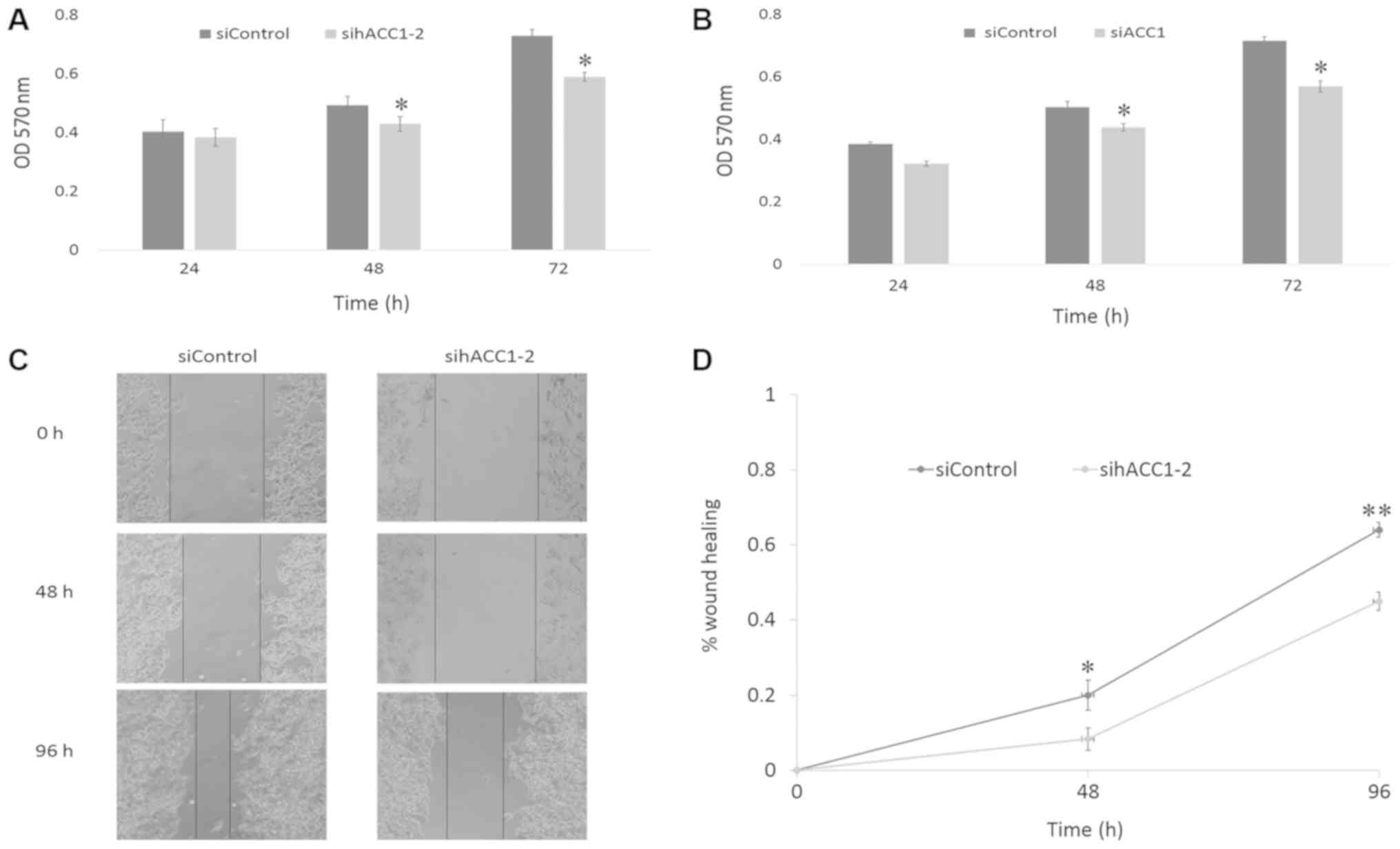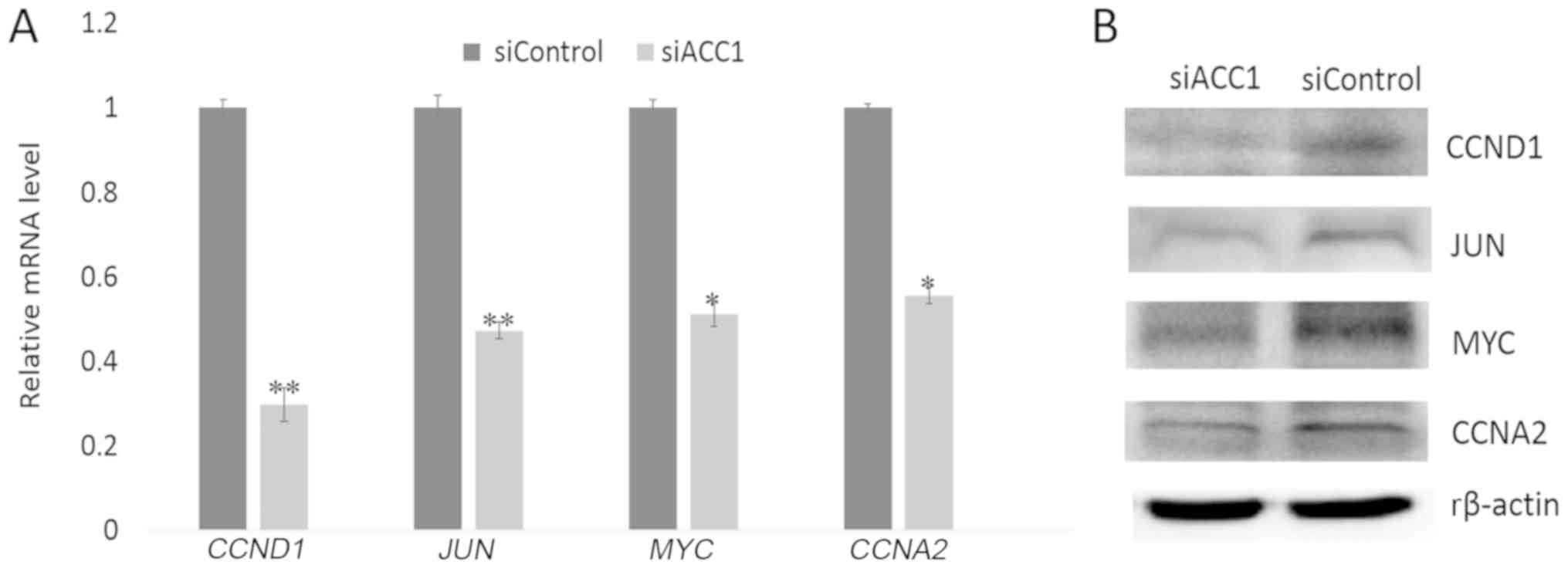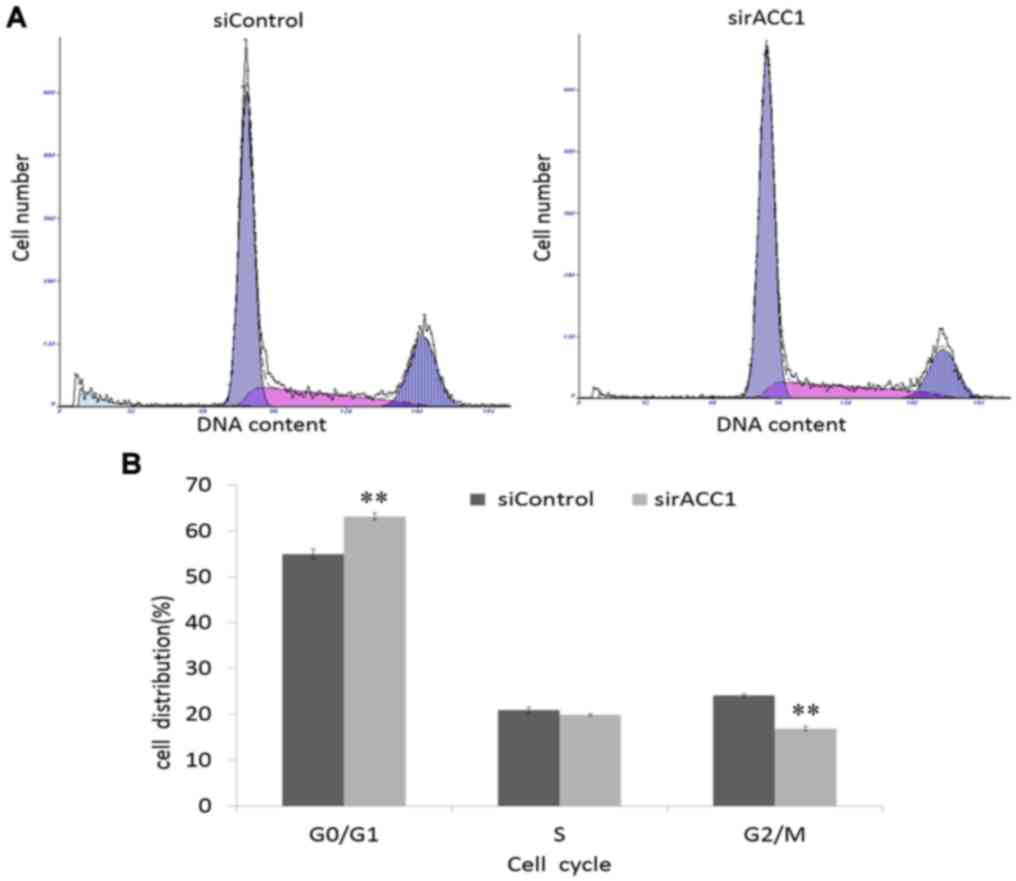|
1
|
Harwood HJ Jr: Treating the metabolic
syndrome: Acetyl-CoA carboxylase inhibition. Expert Opin Ther
Targets. 9:267–281. 2005. View Article : Google Scholar : PubMed/NCBI
|
|
2
|
Kim KH: Regulation of mammalian
acetyl-coenzyme A carboxylase. Annu Rev Nutr. 17:77–99. 1997.
View Article : Google Scholar : PubMed/NCBI
|
|
3
|
McGarry JD, Mannaerts GP and Foster DW: A
possible role for malonyl-CoA in the regulation of hepatic fatty
acid oxidation and ketogenesis. J Clin Invest. 60:265–270. 1977.
View Article : Google Scholar : PubMed/NCBI
|
|
4
|
Nugteren DH: The enzymic chain elongation
of fatty acids by rat-liver microsomes. Biochim Biophys Acta.
106:280–290. 1965. View Article : Google Scholar : PubMed/NCBI
|
|
5
|
Munday MR: Regulation of mammalian
acetyl-CoA carboxylase. Biochem Soc Trans. 30:1059–1064. 2002.
View Article : Google Scholar : PubMed/NCBI
|
|
6
|
Saggerson D: Malonyl-CoA, a key signaling
molecule in mammalian cells. Annu Rev Nutr. 28:253–272. 2008.
View Article : Google Scholar : PubMed/NCBI
|
|
7
|
Glatzel DK, Koeberle A, Pein H, Löser K,
Stark A, Keksel N, Werz O, Muller R, Bischoff I and Fürst R:
Acetyl-CoA carboxylase 1 regulates endothelial cell migration by
shifting the phospholipid composition. J Lipid Res. 59:298–311.
2018. View Article : Google Scholar : PubMed/NCBI
|
|
8
|
Brusselmans K, De Schrijver E, Verhoeven G
and Swinnen JV: RNA interference-mediated silencing of the
acetyl-CoA-carboxylase-alpha gene induces growth inhibition and
apoptosis of prostate cancer cells. Cancer Res. 65:6719–6725. 2005.
View Article : Google Scholar : PubMed/NCBI
|
|
9
|
Jones JE, Esler WP, Patel R, Lanba A, Vera
NB, Pfefferkorn JA and Vernochet C: Inhibition of Acetyl-CoA
Carboxylase 1 (ACC1) and 2 (ACC2) reduces proliferation and de novo
lipogenesis of EGFRvIII human glioblastoma cells. PLoS One.
12:e01695662017. View Article : Google Scholar : PubMed/NCBI
|
|
10
|
Magnard C, Bachelier R, Vincent A,
Jaquinod M, Kieffer S, Lenoir GM and Venezia ND: BRCA1 interacts
with acetyl-CoA carboxylase through its tandem of BRCT domains.
Oncogene. 21:6729–6739. 2002. View Article : Google Scholar : PubMed/NCBI
|
|
11
|
Chajes V, Cambot M, Moreau K, Lenoir GM
and Joulin V: Acetyl-CoA carboxylase alpha is essential to breast
cancer cell survival. Cancer Res. 66:5287–5294. 2006. View Article : Google Scholar : PubMed/NCBI
|
|
12
|
Abu-Elheiga L, Matzuk MM, Abo-Hashema KA
and Wakil SJ: Continuous fatty acid oxidation and reduced fat
storage in mice lacking acetyl-CoA carboxylase 2. Science.
291:2613–2616. 2001. View Article : Google Scholar : PubMed/NCBI
|
|
13
|
Harriman G, Greenwood J, Bhat S, Huang X,
Wang R, Paul D, Tong L, Saha AK, Westlin WF, Kapeller R and Harwood
HJ Jr: Acetyl-CoA carboxylase inhibition by ND-630 reduces hepatic
steatosis, improves insulin sensitivity, and modulates dyslipidemia
in rats. Proc Natl Acad Sci USA. 113:E1796–E1805. 2016. View Article : Google Scholar : PubMed/NCBI
|
|
14
|
Harwood HJ Jr: Acetyl-CoA carboxylase
inhibition for the treatment of metabolic syndrome. Curr Opin
Investig Drugs. 5:283–289. 2004.PubMed/NCBI
|
|
15
|
Schreurs M, van Dijk TH, Gerding A,
Havinga R, Reijngoud DJ and Kuipers F: Soraphen, an inhibitor of
the acetyl-CoA carboxylase system, improves peripheral insulin
sensitivity in mice fed a high-fat diet. Diabetes Obes Metab.
11:987–991. 2009. View Article : Google Scholar : PubMed/NCBI
|
|
16
|
Rhodes DR, Kalyana-Sundaram S, Mahavisno
V, Varambally R, Yu J, Briggs BB, Barrette TR, Anstet MJ,
Kincead-Beal C, Kulkarni P, et al: Oncomine 3.0: Genes, pathways,
and networks in a collection of 18,000 cancer gene expression
profiles. Neoplasia. 9:166–180. 2007. View Article : Google Scholar : PubMed/NCBI
|
|
17
|
Roessler S, Jia HL, Budhu A, Forgues M, Ye
QH, Lee JS, Thorgeirsson SS, Sun Z, Tang ZY, Qin LX and Wang XW: A
unique metastasis gene signature enables prediction of tumor
relapse in early-stage hepatocellular carcinoma patients. Cancer
Res. 70:10202–10212. 2010. View Article : Google Scholar : PubMed/NCBI
|
|
18
|
Aguirre-Gamboa R, Gomez-Rueda H,
Martínez-Ledesma E, Martínez-Torteya A, Chacolla-Huaringa R,
Rodriguez- Barrientos A, Tamez-Peña JG and Treviño V: SurvExpress:
An online biomarker validation tool and database for cancer gene
expression data using survival analysis. PLoS One. 8:e742502013.
View Article : Google Scholar : PubMed/NCBI
|
|
19
|
Livak KJ and Schmittgen TD: Analysis of
relative gene expression data using real-time quantitative PCR and
the 2(-Delta Delta C(T)) method. Methods. 25:402–408. 2001.
View Article : Google Scholar : PubMed/NCBI
|
|
20
|
Boncler M, Różalski M, Krajewska U,
Podsędek A and Watala C: Comparison of PrestoBlue and MTT assays of
cellular viability in the assessment of anti-proliferative effects
of plant extracts on human endothelial cells. J Pharmacol Toxicol
Methods. 69:9–16. 2014. View Article : Google Scholar : PubMed/NCBI
|
|
21
|
Bouchard C, Staller P and Eilers M:
Control of cell proliferation by Myc. Trends Cell Biol. 8:202–206.
1998. View Article : Google Scholar : PubMed/NCBI
|
|
22
|
Miquet JG, Freund T, Martinez CS, Gonzalez
L, Diaz ME, Micucci GP, Zotta E, Boparai RK, Bartke A, Turyn D and
Sotelo AI: Hepatocellular alterations and dysregulation of
oncogenic pathways in the liver of transgenic mice overexpressing
growth hormone. Cell Cycle. 12:1042–1057. 2013. View Article : Google Scholar : PubMed/NCBI
|
|
23
|
Morello D, Lavenu A and Babinet C:
Differential regulation and expression of jun, c-fos and c-myc
proto-oncogenes during mouse liver regeneration and after
inhibition of protein synthesis. Oncogene. 5:1511–1519.
1990.PubMed/NCBI
|
|
24
|
Pauklin S and Vallier L: The cell-cycle
state of stem cells determines cell fate propensity. Cell.
155:135–147. 2013. View Article : Google Scholar : PubMed/NCBI
|
|
25
|
Nelsen CJ, Rickheim DG, Timchenko NA,
Stanley MW and Albrecht JH: Transient expression of cyclin D1 is
sufficient to promote hepatocyte replication and liver growth in
vivo. Cancer Res. 61:8564–8568. 2001.PubMed/NCBI
|
|
26
|
Rickheim DG, Nelsen CJ, Fassett JT,
Timchenko NA, Hansen LK and Albrecht JH: Differential regulation of
cyclins D1 and D3 in hepatocyte proliferation. Hepatology.
36:30–38. 2002. View Article : Google Scholar : PubMed/NCBI
|
|
27
|
Mateyak MK, Obaya AJ and Sedivy JM: c-Myc
regulates cyclin D-Cdk4 and -Cdk6 activity but affects cell cycle
progression at multiple independent points. Mol Cell Biol.
19:4672–4683. 1999. View Article : Google Scholar : PubMed/NCBI
|
|
28
|
Carroll JS, Swarbrick A, Musgrove EA and
Sutherland RL: Mechanisms of growth arrest by c-myc antisense
oligonucleotides in MCF-7 breast cancer cells: Implications for the
antiproliferative effects of antiestrogens. Cancer Res.
62:3126–3131. 2002.PubMed/NCBI
|
|
29
|
Daksis JI, Lu RY, Facchini LM, Marhin WW
and Penn LJ: Myc induces cyclin D1 expression in the absence of de
novo protein synthesis and links mitogen-stimulated signal
transduction to the cell cycle. Oncogene. 9:3635–3645.
1994.PubMed/NCBI
|
|
30
|
Perez-Roger I, Kim SH, Griffiths B, Sewing
A and Land H: Cyclins D1 and D2 mediate myc-induced proliferation
via sequestration of p27(Kip1) and p21(Cip1). EMBO J. 18:5310–5320.
1999. View Article : Google Scholar : PubMed/NCBI
|
|
31
|
Oswald F, Lovec H, Möröy T and Lipp M:
E2F-dependent regulation of human MYC: Trans-activation by cyclins
D1 and A overrides tumour suppressor protein functions. Oncogene.
9:2029–2036. 1994.PubMed/NCBI
|
|
32
|
Riehle KJ, Campbell JS, McMahan RS,
Johnson MM, Beyer RP, Bammler TK and Fausto N: Regulation of liver
regeneration and hepatocarcinogenesis by suppressor of cytokine
signaling 3. J Exp Med. 205:91–103. 2008. View Article : Google Scholar : PubMed/NCBI
|
|
33
|
Herber B, Truss M, Beato M and Müller R:
Inducible regulatory elements in the human cyclin D1 promoter.
Oncogene. 9:1295–1304. 1994.PubMed/NCBI
|
|
34
|
Musgrove EA, Lee CS, Buckley MF and
Sutherland RL: Cyclin D1 induction in breast cancer cells shortens
G1 and is sufficient for cells arrested in G1 to complete the cell
cycle. Proc Natl Acad Sci USA. 91:8022–8026. 1994. View Article : Google Scholar : PubMed/NCBI
|
|
35
|
Gong D, Pomerening JR, Myers JW,
Gustavsson C, Jones JT, Hahn AT, Meyer T, Meyer T and Ferrell JE
Jr: Cyclin A2 regulates nuclear-envelope breakdown and the nuclear
accumulation of cyclin B1. Curr Biol. 17:85–91. 2007. View Article : Google Scholar : PubMed/NCBI
|
|
36
|
Garnier D, Loyer P, Ribault C,
Guguen-Guillouzo C and Corlu A: Cyclin-dependent kinase 1 plays a
critical role in DNA replication control during rat liver
regeneration. Hepatology. 50:1946–1956. 2009. View Article : Google Scholar : PubMed/NCBI
|
|
37
|
Hatzivassiliou G, Zhao F, Bauer DE,
Andreadis C, Shaw AN, Dhanak D, Hingorani SR, Tuveson DA and
Thompson CB: ATP citrate lyase inhibition can suppress tumor cell
growth. Cancer Cell. 8:311–321. 2005. View Article : Google Scholar : PubMed/NCBI
|
|
38
|
Zhan Y, Ginanni N, Tota MR, Wu M, Bays NW,
Richon VM, Kohl NE, Bachman ES, Strack PR and Krauss S: Control of
cell growth and survival by enzymes of the fatty acid synthesis
pathway in HCT-116 colon cancer cells. Clin Cancer Res.
14:5735–5742. 2008. View Article : Google Scholar : PubMed/NCBI
|
|
39
|
Rysman E, Brusselmans K, Scheys K,
Timmermans L, Derua R, Munck S, Van Veldhoven PP, Waltregny D,
Daniëls VW, Machiels J, et al: De novo lipogenesis protects cancer
cells from free radicals and chemotherapeutics by promoting
membrane lipid saturation. Cancer Res. 70:8117–8126. 2010.
View Article : Google Scholar : PubMed/NCBI
|
|
40
|
Svensson RU, Parker SJ, Eichner LJ, Kolar
MJ, Wallace M, Brun SN, Lombardo PS, Van Nostrand JL, Hutchins A,
Vera L, et al: Inhibition of acetyl-CoA carboxylase suppresses
fatty acid synthesis and tumor growth of non-small-cell lung cancer
in preclinical models. Nat Med. 22:1108–1119. 2016. View Article : Google Scholar : PubMed/NCBI
|
|
41
|
Hasslacher M, Ivessa AS, Paltauf F and
Kohlwein SD: Acetyl-CoA carboxylase from yeast is an essential
enzyme and is regulated by factors that control phospholipid
metabolism. J Biol Chem. 268:10946–10952. 1993.PubMed/NCBI
|
|
42
|
Al-Feel W, DeMar JC and Wakil SJ: A
Saccharomyces cerevisiae mutant strain defective in acetyl-CoA
carboxylase arrests at the G2/M phase of the cell cycle. Proc Natl
Acad Sci USA. 100:3095–3100. 2003. View Article : Google Scholar : PubMed/NCBI
|
|
43
|
Savage DB, Choi CS, Samuel VT, Liu ZX,
Zhang D, Wang A, Zhang XM, Cline GW, Yu XX, Geisler JG, et al:
Reversal of diet-induced hepatic steatosis and hepatic insulin
resistance by antisense oligonucleotide inhibitors of acetyl-CoA
carboxylases 1 and 2. J Clin Invest. 116:817–824. 2006. View Article : Google Scholar : PubMed/NCBI
|
|
44
|
Abu-Elheiga L, Matzuk MM, Kordari P, Oh W,
Shaikenov T, Gu Z and Wakil SJ: Mutant mice lacking acetyl-CoA
carboxylase 1 are embryonically lethal. Proc Natl Acad Sci USA.
102:12011–12016. 2005. View Article : Google Scholar : PubMed/NCBI
|















